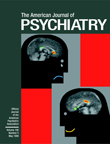Drs. Dukoff and Sunderland Reply
To the Editor: We want to thank David W. Crumpacker, M.D., and Catherine S. Fontaine, M.D., for their interest and response to our article about the use of the durable power of attorney for research with patients who have Alzheimer’s disease. It is important to note that our concern for patients’ rights led us to develop and examine a process for involving cognitively impaired subjects in research in the first place. It seems that if patients, families, and society at large are interested in conducting research with Alzheimer’s disease, it should be conducted with as much attention as possible to informed consent. The research-oriented durable power of attorney is the National Institute of Mental Health’s attempt to facilitate that important process. However, as Drs. Crumpacker and Fontaine correctly point out, a person with a durable power of attorney cannot override the expressed wishes of an individual patient. It is clearly stated in our article that a person with a durable power of attorney acts with the patient’s presumed wishes in mind at all times. We completely concur with Drs. Crumpacker and Fontaine’s timely reminder that physicians need to be sensitive to a patient’s right to due process and to be knowledgeable about concurrent guardianship issues whenever considering a research project for patients with Alzheimer’s disease.



